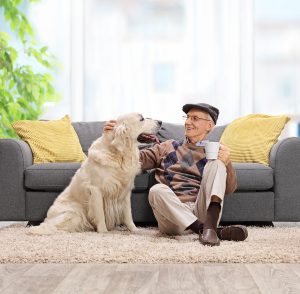
Animals have been providing companionship to humans since time immemorial. Pets are by our sides and provide endless love and affection to form a bond that is special and unexplainable. Not only do animals provide physical benefits but also emotional and social benefits to enrich our lives, and give structure and balance to it. An Emotional support Animal (ESA) is typically a dog or any other common domesticated animal.
These animals provide therapeutic support to people who are either old or disabled through affection, companionship, focus in life and non-judgmental constructive regard. If a patient is diagnosed with a mental illness and his/her doctor believes that an emotional support animal would be of benefit, they can write a letter supporting a request for the patient to keep the emotional support animal in “no pets” travel or housing with the ESA in the cabin of an airplane.
ESAs are not task trained like service dogs. In reality, only little training is needed till the animal is reasonably trained and well behaved as per the pet standards. This includes complete potty training and ensuring the animal has no bad habits in particular, such as lengthy or frequent barking episodes, which may disturb the people around. Since people who need ESAs are generally dependent themselves, the animals provided to them are full trained to reduce their hassle.
 The animal should also be harmless to surrounding workmen and tenants. However, there is no need for mitigating tasks or fancy heeling as emotional support animals are usually not allowed anywhere ordinary pets would not go without permission. The only exception in the case of ESAs remains their ability to fly on board an aircraft, in the cabin, regardless of whether the airline accepts pets or not.
The animal should also be harmless to surrounding workmen and tenants. However, there is no need for mitigating tasks or fancy heeling as emotional support animals are usually not allowed anywhere ordinary pets would not go without permission. The only exception in the case of ESAs remains their ability to fly on board an aircraft, in the cabin, regardless of whether the airline accepts pets or not.
The most common quality almost all ESAs share is their ability to provide companionship to their owners or handlers. Whether an ESA is a dog or a snake, it will make its human companion feel good and sociable. This gives you a reason to get up on days you may not feel like it, and keeps you busy enough to take your mind off negativity and boredom.
If you have a relatively bigger ESA, like a cat or dog, you are responsible for their health and wellbeing. This sense of responsibility breeds a feeling of achievement when you see your pet responding to your commands The great thing about emotional support animals is that they are always so happy to be around and practically ask nothing in return (except for the basics). All this can greatly alleviate the feeling of loneliness and anxiety.
An emotional support animal, especially a dog, can make you feel safer. If you have low resistance to solitude, an ESA is a great way to get rid of the feeling of boredom and isolation, and feel safe and secure. Coming home to a wagging tail is just enough to melt away the day’s stress and grief and know that there is someone who is more than pleased to see you. An emotional support animal makes you feel loved and needed, and of course less lonely.
An ESA can also help you through tough times, like the death of a loved one by providing emotional support through their presence. An emotional support dog will quickly detect your sadness and do its best to make you feel happy again. These animals, with their clowning around, can help you put away your gloomy glasses and look at the world through a new and improved perspective, all the while motivating you to look for the good in all circumstances.